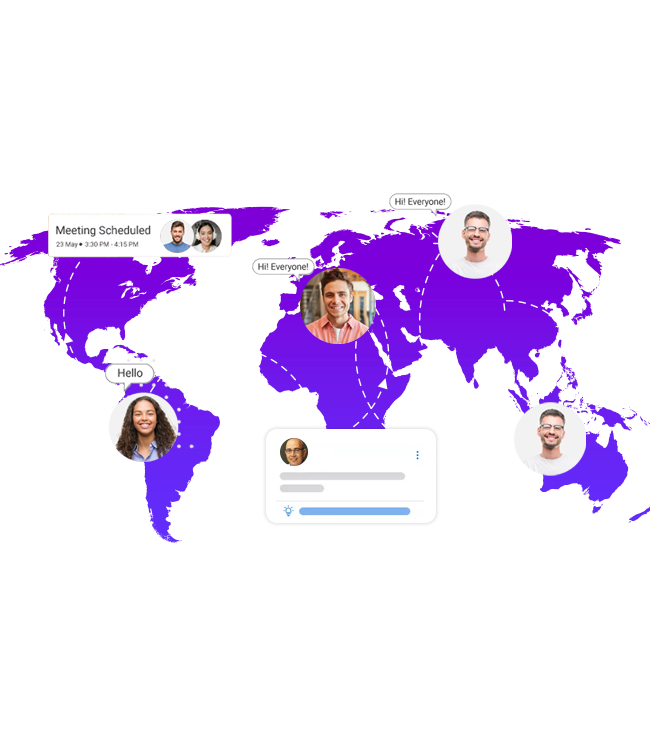Global recruitment has revolutionized the hiring landscape, offering organizations access to a diverse pool of talent beyond local boundaries. In the past, hiring locally was the norm, but it often limited the available talent pool. Factors like a saturated job market or the need for multilingual professionals for global expansion may necessitate a broader recruitment approach. Enter global recruitment, where organizations cast their net wider to attract top talent from around the world.
With global recruitment, companies can tap into a wealth of diverse backgrounds, skillsets, and knowledge that traditional hiring methods may overlook. Remote hiring has emerged as a prominent trend in the job market, allowing organizations to access talent irrespective of geographical constraints. By embracing global recruitment, businesses can stay competitive in a rapidly evolving global economy and ensure they have the right talent to drive success.
Initiating the process of global recruitment requires careful planning and strategic execution to identify and engage top talent from around the world. This comprehensive global recruitment guide offers valuable insights and practical tips to help you navigate the complexities of international hiring and build a diverse and skilled workforce for your organization.
Exploring the Advantages of Global Recruitment
Global recruitment offers numerous advantages for businesses seeking to expand their talent pool and remain competitive in today’s global marketplace. Embracing an international approach to talent acquisition can lead to several benefits and opportunities. Here are some compelling reasons why organizations should consider global recruitment:
Access to a Diverse Talent Pool: Global recruitment allows businesses to tap into a diverse talent pool spanning different countries, cultures, and backgrounds. This diversity can bring fresh perspectives, innovative ideas, and unique skills to the organization, fostering creativity and driving growth.
Fill Skill Gaps: In some cases, businesses may struggle to find qualified candidates with specific skill sets or expertise in their local talent pool. Global recruitment enables organizations to overcome skill shortages by casting a wider net and identifying candidates with the right skills and experience, regardless of their location.
Support Business Expansion: For businesses looking to expand into new markets or regions, global recruitment is essential for building a strong workforce in target locations. Hiring locally in new markets can help businesses navigate cultural nuances, language barriers, and regulatory requirements more effectively, supporting successful expansion initiatives.
Access to Specialized Talent: Certain industries or sectors may require access to specialized talent that is not readily available locally. Global recruitment allows businesses to connect with professionals with niche skills or expertise, ensuring they have the talent they need to thrive in competitive markets.
Enhance Diversity and Inclusion: Embracing global recruitment can help organizations foster diversity and inclusion within their workforce. By hiring employees from different backgrounds and cultures, businesses can create a more inclusive and welcoming environment, where employees feel valued, respected, and empowered to contribute their unique perspectives.
Stay Competitive: In today’s fast-paced business environment, organizations must stay agile and responsive to changing market demands. Global recruitment enables businesses to adapt quickly to evolving needs by accessing talent from around the world. This agility allows organizations to stay competitive and innovate in a rapidly changing landscape.
By embracing global recruitment, organizations can unlock a world of opportunities and position themselves for long-term success in an increasingly interconnected world.
Global Recruitment Challenges

Navigating the complexities of global recruitment requires organizations to be aware of and prepared for the challenges that come with it. From language and cultural barriers to legal compliance and cost considerations, here are some of the most common hurdles encountered in international talent acquisition:
Language and Cultural Barriers
Effective communication is crucial when dealing with candidates from diverse linguistic and cultural backgrounds. Miscommunication can hinder the hiring process and impact candidate integration. Employers should establish clear communication channels, offer language support when needed, and promote cultural sensitivity throughout the recruitment process.
Legal and Regulatory Compliance
Each country has its own immigration laws, work permits, and visa requirements, making compliance a complex task. Navigating these legal landscapes requires a thorough understanding of the rules and processes involved. Organizations must ensure compliance to avoid legal complications and ensure a smooth transition for international hires.
Time Zone and Geographic Challenges
Working across different time zones and geographies can present logistical challenges. Coordinating interviews and meetings with candidates in different parts of the world requires flexibility and accommodation to ensure a seamless recruitment experience.
Candidate Evaluation and Selection
Assessing candidates from diverse backgrounds requires adapting evaluation methods to account for cultural nuances and varying educational systems. Employers should consider implementing culturally sensitive and standardized evaluation methods to effectively assess candidate skills and qualifications.
Onboarding and Integration
Effective onboarding is crucial for international hires to acclimate to a new country, work environment, and cultural norms. Providing comprehensive orientation programs and cultural integration initiatives can facilitate a smooth transition and improve employee retention rates.
Cost Considerations
Global recruitment often comes with higher costs due to relocation expenses, visa sponsorship, and international travel. Organizations need to carefully assess and budget for these additional expenses while balancing the desired skills and qualifications of international hires.
By understanding and addressing these challenges, organizations can develop effective strategies for international talent acquisition and harness the benefits of a diverse workforce in the global marketplace.
Also check, international student recruitment trends and challenges.
Recruiting International Candidates
For successful global recruitment, organizations must adhere to best practices specifically designed for international talent acquisition. These practices improve the likelihood of attracting, selecting, and hiring qualified candidates globally. Here are some essential best practices for global recruitment:
Strategic Workforce Planning for Global Expansion
Begin by conducting a comprehensive assessment of your organization’s talent needs and align them with your global expansion goals. Identify the specific skills, expertise, and language requirements necessary for each position. This proactive approach to workforce planning streamlines the recruitment process and ensures targeted efforts to support your international growth strategy.
You can begin with crafting a hiring strategy such as;
-
- Determine your target countries and regions
-
- Decide on a budget for global recruitment
-
- Create job boards by listing vacancies
-
- Tailor a remote workforce management plan
-
- Develop a remote workforce onboarding strategy
-
- Make a comprehensive employee benefits program
Expanding Your Reach: Leveraging International Job Search Platforms

Harness the power of specialized international job search platforms to promote your job openings effectively. These platforms cater to a global audience of job seekers actively seeking opportunities abroad. Consider collaborating with local recruiters or utilizing virtual recruitment platforms specialized in global talent acquisition to access a diverse pool of candidates and broaden your reach.
Numerous free and paid job listing platforms are available online to support your global talent acquisition efforts. Platforms like Indeed and LinkedIn are among the most popular international recruitment sites, connecting candidates with top job opportunities worldwide. By leveraging these platforms, employers can attract talent from around the globe while providing candidates with access to a wide range of global job opportunities.
Cultural Competence and Sensitivity
Developing cultural competence is crucial for engaging candidates from diverse backgrounds. Equip your recruitment team with cultural sensitivity training to understand different norms, customs, and communication styles. This fosters positive candidate experiences, reduces misunderstandings, and showcases your organization as inclusive and welcoming.
Streamlined Application and Assessment Process
Simplify your application and assessment process to make it accessible for international candidates. Utilize virtual platforms and video interviewing tools to conduct remote interviews and overcome geographical barriers. This streamlined approach enhances candidate engagement, reduces time-to-hire, and improves the overall recruitment experience.
Cultural Fit Assessment
Assess the cultural fit of candidates alongside their qualifications. Look for candidates who align with your company’s values, work environment, and team dynamics. Seek individuals who demonstrate adaptability and open-mindedness, ensuring successful integration into your organization’s culture.
Support with Relocation and Integration
Provide comprehensive support during the relocation and integration process for international hires. Assist with visa applications, housing, and navigating local bureaucracy. Implement onboarding programs to help new employees acclimate to the work environment and team dynamics. Assign mentors to guide international hires through the transition.
Promote Remote Work Culture
Embrace remote work to offer flexibility to employees, allowing them to work from anywhere. Remote work fosters autonomy, trust, and productivity, enabling employees to manage their schedules effectively. It also expands access to a global talent pool, enhancing diversity and skill sets within the organization.
Emphasize Diversity and Inclusion
Promote diversity and inclusion throughout the recruitment process. Encourage a diverse candidate pool and provide equal opportunities for all applicants. Cultivate an inclusive work environment that values different perspectives and backgrounds, fostering innovation and creativity.
Role of Virtual Platforms in Global Recruitment
Virtual platforms have revolutionized the concept of job fairs by offering innovative solutions that overcome the limitations of traditional in-person events. These virtual platforms provide a range of features and benefits that enhance the job fair experience for both employers and candidates.
This article explores how a virtual platform can help organizations with job fairs and the advantages they bring to the recruitment process.
Global Reach and Accessibility
Virtual platforms offer organizations the opportunity to reach a global audience of candidates, transcending geographical limitations typical of in-person job fairs. By hosting virtual job fairs, organizations can attract job seekers from around the world without the need for travel expenses or logistical hurdles. This expanded reach not only diversifies the candidate pool but also taps into a broader talent market.
Learn more about why a virtual platform is the best option for high-volume recruitment.
3D Animated Virtual Space
Immerse participants in a lifelike 3D virtual environment that simulates physical presence, even from remote locations. This interactive setting enhances engagement, allowing attendees to explore virtual booths, attend presentations, and network seamlessly. Furthermore, the customizable nature of 3D virtual environments offers ample branding opportunities, enabling employers to showcase their company culture and brand identity effectively.
Interactive Virtual Booths
Engage candidates with interactive virtual booths that mirror the experience of in-person booth interactions. Employers can personalize their virtual booths with company information, videos, and job listings, fostering meaningful interactions with candidates through chat or video. This dynamic engagement helps employers spotlight their employer brand, capture candidates’ attention, and nurture meaningful connections.
Live Presentations and Webinars
Host live presentations and webinars to offer insights into company culture, career opportunities, and industry trends. These interactive sessions allow employers to showcase their expertise, attract a broader audience, and engage with candidates in real time. Job seekers can participate actively, ask questions, and gain valuable insights to inform their career decisions.
Advanced Search and Filtering
Empower job seekers with advanced search and filtering tools to navigate virtual job fairs efficiently. Candidates can refine their search based on specific criteria such as job title, industry, and location, streamlining the job search process. For employers, this targeted search functionality ensures that job openings are visible to the most relevant and qualified candidates.
Data Analytics and Metrics
Harness valuable data analytics and metrics to evaluate the success of virtual job fairs. Virtual platforms provide insights into metrics like booth visits, candidate engagement, and application rates, enabling organizations to assess recruitment strategies effectively. These insights inform decision-making, highlight areas for improvement, and drive future recruitment efforts.
Learn more about tips for choosing the right virtual career fair vendor.
In Conclusion
Global recruitment is a multifaceted process that requires a strategic approach to attract and hire talent from around the world. It involves leveraging various channels, such as international job search platforms, networking, and partnerships, to reach a diverse pool of candidates. International hiring also entails addressing challenges such as language and cultural barriers, legal compliance, time zone differences, and candidate evaluation.
By implementing best practices, organizations can optimize their global recruitment efforts, expand their talent pool, and build a diverse and skilled workforce that contributes to their success in the global marketplace. Partner with Virtual Days to welcome a global talent pool in a custom-designed 3D immersive environment. You can attract the right candidates from around the world and easily build a remote workforce through virtual job fairs or career events.






